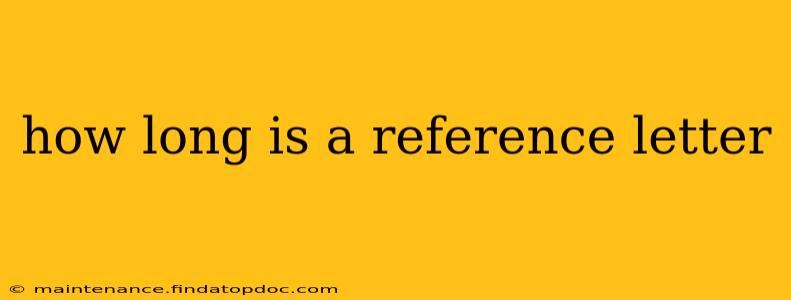How Long Should a Letter of Recommendation Be?
The ideal length for a letter of recommendation isn't rigidly defined, but it generally falls within a specific range to effectively convey the necessary information without being overly verbose or too brief. Aim for a balance that demonstrates your thorough knowledge of the applicant while remaining concise and impactful.
Generally, a strong letter of recommendation will be between one and two pages long. However, this is a guideline, not a hard rule. The actual length depends on several factors, including:
- The applicant's experience: A candidate with extensive experience might require a longer letter to fully cover their accomplishments and qualifications. A recent graduate with limited professional experience might need a shorter, more focused letter.
- The recipient's requirements: Some applications specify a word count or page limit. Always check the application instructions carefully before writing the letter.
- The nature of the relationship: A letter based on a long-term, close working relationship might naturally be longer than one based on a shorter, less intense interaction.
What Makes a Letter Too Short?
A letter that's too short often lacks sufficient detail and may raise concerns about the recommender's commitment or knowledge of the applicant. A brief letter might appear rushed or superficial, failing to adequately showcase the applicant's strengths.
What Makes a Letter Too Long?
Conversely, a letter that's excessively long can become tedious and lose the reader's attention. Overly long letters often lack focus and may contain irrelevant information, diluting the impact of the key points. A lengthy letter can also indicate poor organization and editing.
How to Determine the Right Length:
The best approach is to focus on providing a comprehensive but concise evaluation. Think of the letter as a well-structured argument demonstrating why the applicant is a strong candidate. Each paragraph should serve a specific purpose, presenting clear evidence and supporting details.
Here's a suggested structure to guide your writing and help you achieve the ideal length:
- Introduction (1 paragraph): Briefly state your relationship with the applicant and the context of your recommendation.
- Body Paragraphs (2-4 paragraphs): Describe specific examples of the applicant's skills, accomplishments, and qualities relevant to the application. Use quantifiable results whenever possible.
- Conclusion (1 paragraph): Summarize your overall assessment and reiterate your strong recommendation.
In short, prioritize quality over quantity. A well-crafted, one-page letter that provides substantial evidence of the applicant's capabilities is far more effective than a rambling, two-page letter lacking focus.
What if I'm asked about specific criteria?
H2: What if the application asks for specific criteria?
Many applications specify criteria they wish addressed in the letter of recommendation. These criteria may significantly influence the overall length. If specific traits or skills are listed, you'll need to dedicate adequate space to discuss each one thoroughly with concrete examples. This could make even a short relationship warrant a longer letter.
H2: How long should a reference letter be for a job?
Generally, the same one-to-two-page rule applies for job applications. However, the length should always be proportionate to the seniority and complexity of the position. A letter for a senior executive role may require more detailed examples to demonstrate leadership abilities and experience, while a letter for an entry-level position might be shorter and more focused on potential and key skills.
By focusing on providing concrete examples and a well-structured argument, you can craft a letter of recommendation that is both effective and appropriately lengthed, regardless of the specific application. Remember to always proofread carefully before submitting.
